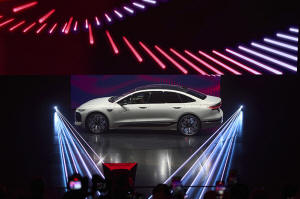EVs in the spotlight as China claims a leading global role at Shanghai's
auto show
[April 23, 2025] By
ELAINE KURTENBACH
SHANGHAI (AP) — Leading automakers will be showcasing their latest
designed-for-China models at the Shanghai auto show this week,
struggling not to be edged aside in the world’s largest car market while
watching for U.S. President Donald Trump’s next steps in his trade war.
Some industry experts view this year's show in the sprawling industrial
outskirts of Shanghai as a tipping point. Three decades after Beijing
set out to build a world-class auto industry, local manufacturers
account for about two-thirds of sales inside China, and a growing share
of global exports.
The exhibition opens to the public on Thursday and runs until May 2.
Electrics gaining ground
Encouraged by government subsidies for scrapping older cars for the
latest models, Chinese drivers have embraced the switch to electrics,
with sales of battery powered and hybrid vehicles jumping 40% last year.
A total of 31.4 million vehicles including buses and trucks were sold
last year in the world’s biggest market by sales, up 4.5% compared to a
year earlier, the China Association of Automobile Manufacturers
reported.
Growth in sales of EVs was offset by falling sales of traditional
gasoline and diesel-powered vehicles, which still accounted for just
over half of new car sales.
Chinese electric vehicle maker BYD nudged past Tesla as the world’s
biggest maker of EVs by sales last year, reporting revenue of over $100
billion. It recently announced an ultra fast EV charging system that it
says can provide a full charge for its latest EVs within five to eight
minutes, about the time needed to fill up at the pump. It plans to build
more than 4,000 of the new charging stations across China.

Survival of the fittest
To gain access to China's potentially huge market, foreign automakers
like Volkswagen, General Motors, BMW and Ford set up joint ventures with
state-owned local companies beginning in the 1980s and 90s, helping them
build the capacity and technology to compete on a world scale.
They also created sprawling supply chains in Shanghai and other major
manufacturing hubs, helping to nurture other big names in Chinese
automaking, such as BYD, Geely and Great Wall Motors.
Facing brutal competition at home, Chinese automakers are expanding
rapidly into many world markets, winning market share with relatively
affordable sedans, SUVs and pickup trucks.
Shanghai’s auto show is a gathering for the “survival of the fittest,”
Zhou Lijun, director and chief researcher of the industry analysis group
Yiche Research Institute, said. It’s also a turning point in that local
automakers have switched from a supporting role to being the real
protagonists on the world stage, he said.
That doesn't mean all the EV makers go it alone. BYD teamed up with
Daimler, now the Mercedes-Benz Group, to launch its Denza premium brand,
featured on billboards in Southeast Asian capitals like Bangkok.
Tariffs and other challenges
Opening markets wider to foreign competition has given car buyers a
choice of more affordable, innovative vehicles. But that has been a
mixed blessing for older automakers like GM, Ford, Toyota and VW that
now face fiercer competition both at home and abroad.
[to top of second column] |

The A6L-etron is launched during the Volkswagen Group media night
ahead of the Auto Show in Shanghai, Tuesday, April 22, 2025. (AP
Photo/Ng Han Guan)
 Trump doubled down on tariffs on
Chinese goods, raising them to up to 145%. His recent announcement
of a 90-day pause temporarily spared many other countries including
Japan from 24% across-the-board tariffs. But a 10% baseline tariff
and a 25% tax on imported cars, auto parts, steel and aluminum
exports remains in place.
Higher U.S. and European tariffs on foreign-made EVs are prompting
Chinese newcomers to shift production closer to those markets as
more Western consumers opt for the latest Chinese models.
Not that long ago, Japanese automakers were doing the same, as they
fought trade friction with the United States over their own exports.
Now, Toyota, Honda and Nissan employ hundreds of thousands of U.S.
workers at their U.S. factories.
“The trade war between China and the United States has blocked
direct exports from China to the United States, but it hasn't
blocked local production there or the establishment of global
production bases in Europe or elsewhere," Zhou said.
But as Trump's 25% tariffs on foreign-made vehicles shows, other
factors may slow that expansion.
A report by the Rhodium Group shows that nearly half the world's
markets are restricting imports from China, in part because of
national security concerns linked to the advanced electronics in EVs
and other high-tech vehicles. About 12% of the global market is
relatively open, including countries like Australia and South
Africa, and Russia is a major market but is nearly saturated, it
says.
The road ahead
Chinese automakers lag behind global leaders like Toyota in
conventional gasoline and diesel fueled vehicles, but they can sell
EVs at roughly the same price, while also solving the problems of
range and fast charging.
China has become part of what geopolitical analyst Yanmei Xie
described, in a commentary in the Japanese financial publication
Nikkei Asia, as a “technological paradigm shift.” Automakers in
China are going electric not just because of the green transition,
but as a route to “technological and industrial dominance,” she
wrote.
EV makers in China have benefited from not having huge legacy
operations that have to make the transition, Stefan Sielaff, vice
president of global design for EV maker Zeekr Group, part of Geely's
stable of brands. Founded in 2021, it's selling cars in more than 80
markets including in Europe.
“Therefore they can immediately react to market demand, to customer
demand, and can deliver very, very fast,” he said. "We have done
most of these cars in two years. From 0 to 100 in two years.
All contents © copyright 2025 Associated Press. All rights reserved
 |